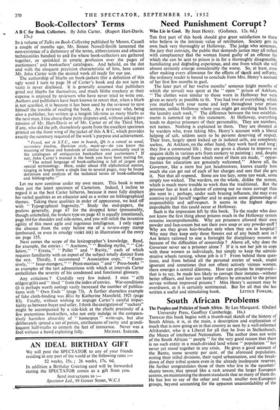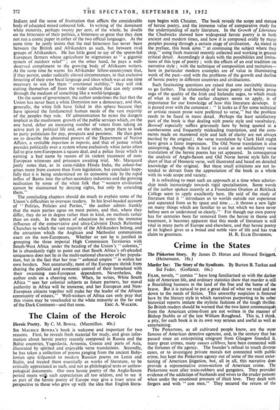South African Problems
The Peoples and Policies of South Africa. By Leo Marquard. (Oxford University Press, Geoffrey Cumberlege. 16s.)
THOUGH this book begins with a thumb-nail sketch of the history of South Africa, it is, in the main, a description and explanation of much that is now going on in that country as seen by a well-informed Afrikander, who is a Liberal for all that he lives in Stellenbosch, the Mecca of intellectual Nationalism. The author does not write of the South African " people " for the very good reason That there is no such entity in a much:divided land whose " population " has never yet stood together in any crisis. He gives a good account of the Bantu, some seventy per cent. of the aforesaid population, noting their tribal divisions, their rapid urbanisation, and the break- down of their tribal system even in the already inadequate reserves. He further congratulates those of them who live in the squatters' shanty towns, that spread like a rash around the larger European centres, on maintaining the decent standards that so many of them do. He has less to say of the other and much smaller non-European groups, beyond accounting for the apparent unassimilability of the Indians and the sense of frustration that afflicts the considerable body of educated mixed coloured folk. In writing of the dominant white minority, perhaps twenty per cent. of the whole, he dwells on the bitterness of their politics, a bitterness so great that they dare not run a comic paper in either of the two official languages. At the same time he justly insists that the real bitterness has never been between the British and Afrikanders as such, but between rival groups of Afrikanders. He has little good to say of the spoon-fed European farmers whose agriculture he stigmatises as " a gigantic system of outdoor relief" ; on the other hand, he pays a well- deserved compliment to the growing body of Afrikaans writers. At the same time he warns his Afrikander fellow-countrymen that, if they persist, under radically altered circumstances, in that exclusive fostering of their own local language and ideas which was at one time necessary to win for them " emotional stability," they will risk cutting themselves off from the wider culture that can only come through the medium of something like a world-language. On the score of government, the author underlines the fact that the Union has never been a white Dominion nor a democracy, and that, generally, the white folk have failed in this sphere because they have 'ignored the fundamental human needs of the vast majority of the peoples they rule. Of administration he notes the dangers implicit in the mushroom growth of the public services which, on the one hand, debar an increasing number of voters from taking an active part in political life and, on the other, tempt them to look to party politicians for pay, prospects and pensions. He then goes on to describe the abnormal powers of the Department of Native Affairs, a veritable imperium in imperio, and that of justice which presides politically over a system whose exclusively white juries often fail to give non-Europeans a square deal, and a police force which is earning a bad name by reason of its violent treatment of non- European witnesses and prisoners awaiting trial. Mr. Marquard justly notes that, as in caste-ridden Hindu India, the colour-bar arises more from custom than from legislation, but concludes hope- fully that it is being undermined on its economic side by the rapid influx of Bantu into the urban secondary industries and the growing realisation by some of the white folk that " western civilisation cannot be maintained by denying rights, but only by extending them."
The concluding chapters should do much to explain some of the Union's difficulties to overseas readers. In his level-headed account of " Politics, Policies and Parties," the author admits frankly that the main parties agree on most points, and that, where they differ, they do so in degree rather than in kind, on methods rather than on ends. In the sphere of education he notes the immense influence of the conservative and ultra-Calvinist Dutch Reformed Churches to which the vast majority of the Afrikanders belong, and the attraction which the Anglican and Methodist communions exert on the non-Europeans. Whether or not he is justified in grouping the three imperial High Commission Territories with South-West Africa under the heading of the Union's " colonies," he is abundantly right to point out that South Africa's oft-pleaded uniqueness does not lie in the multi-national character of her popula- tion, but in the fact that her true " colonial empire " is within her own borders. Not unnaturally, most of the Europeans shrink from sharing the political and economic control of their homeland with their swarming nen-European dependents. Nevertheless, the author ends on a cheering note. When, he writes, White South Africa " sees her colonial subjects as future partners, her moral authority in Africa will be immense, and her European and Non- European citizens together will make her the leader of the African community of estates." Well-wishers of Africa can only pray that this vision may be vouchsafed to the white minority at the far end of the Dark Continent—and that soon. ERIC A. WALKER.



































 Previous page
Previous page